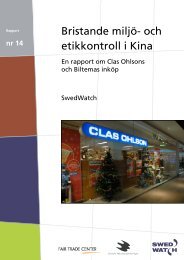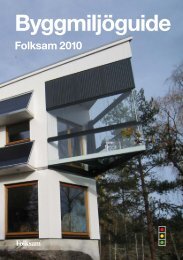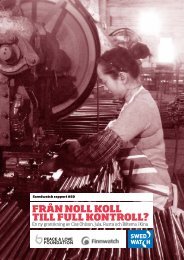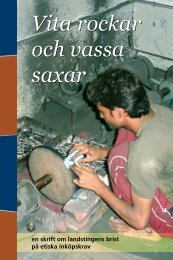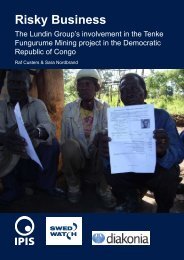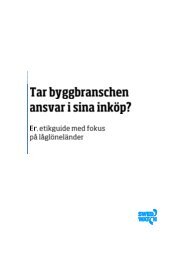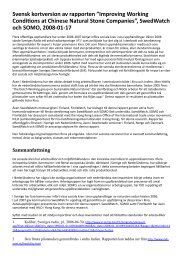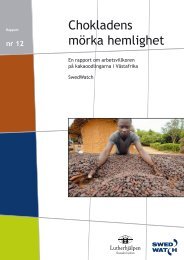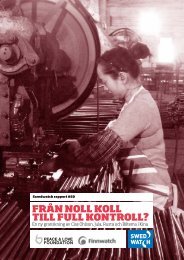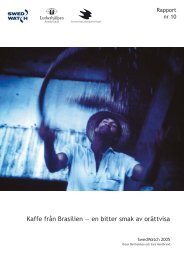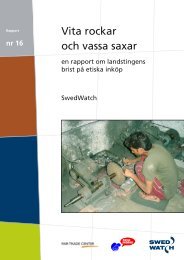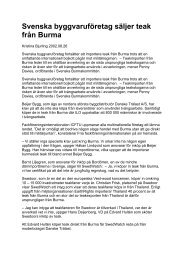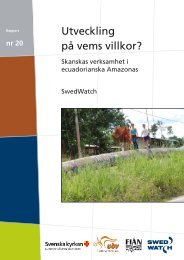4. Case study: Top Toy, Brio and Coop in China - Swedwatch
4. Case study: Top Toy, Brio and Coop in China - Swedwatch
4. Case study: Top Toy, Brio and Coop in China - Swedwatch
Create successful ePaper yourself
Turn your PDF publications into a flip-book with our unique Google optimized e-Paper software.
Summary<br />
In the past year SwedWatch has carried out research on the Nordic companies' purchase of<br />
toys <strong>in</strong> Ch<strong>in</strong>a. We have found that violations of the workers' rights are recurrent phenomena<br />
<strong>in</strong> the manufactur<strong>in</strong>g of toys that we give to our children. In May 2004 SwedWatch carried<br />
out an <strong>in</strong>quiry on the ground <strong>in</strong> Guangdong, Ch<strong>in</strong>a. Currently, more than 75 percent of the<br />
total toy production takes place <strong>in</strong> Ch<strong>in</strong>a, a country where the workers risk long imprisonment<br />
if they follow their basic human rights. The toys are foremost produced by young female<br />
guest workers from the north of Ch<strong>in</strong>a.<br />
SwedWatch has chosen to focus our research on some of the largest toy sell<strong>in</strong>g companies <strong>in</strong><br />
Sweden, <strong>Top</strong> <strong>Toy</strong> (BR-toys <strong>and</strong> <strong>Toy</strong>s R Us), <strong>Brio</strong> <strong>and</strong> <strong>Coop</strong>. Other <strong>in</strong>ternational companies<br />
that are mentioned <strong>in</strong> the report are Disney, Wal-mart <strong>and</strong> Mattel. <strong>Toy</strong>s are however also sold<br />
by many companies who purchase their material through importers. These companies do not<br />
only <strong>in</strong>flict less strict ethical dem<strong>and</strong>s but also have less presence <strong>in</strong> the factories <strong>in</strong> Ch<strong>in</strong>a<br />
than compared to the companies arrang<strong>in</strong>g their own direct import.<br />
SwedWatch did not <strong>in</strong> any way want to risk the employment or safety of the employees. We<br />
have therefore chosen not to do any <strong>in</strong>terviews with workers on our own, neither <strong>in</strong>side nor<br />
outside the plant. Instead, the Hong Kong Christian Industrial Committee, HKCIC, which has<br />
long experience of similar work among migrant workers <strong>in</strong> southern Ch<strong>in</strong>a, carried out these<br />
<strong>in</strong>terviews <strong>in</strong> which the anonymity of the workers was ma<strong>in</strong>ta<strong>in</strong>ed.<br />
In February 2004 HKCIC carried out an <strong>in</strong>quiry on n<strong>in</strong>e companies, which are suppliers for<br />
the Swedish toy sell<strong>in</strong>g companies. HKCIC <strong>in</strong>terviewed around twelve workers outside every<br />
one of the plants. The <strong>in</strong>quiry was made on suppliers selected by the Nordic companies. In all<br />
probability the exam<strong>in</strong>ed plants are thus among the companies own<strong>in</strong>g better conditions.<br />
Despite this, we found breaches aga<strong>in</strong>st Ch<strong>in</strong>ese legislation <strong>and</strong> the codes of conduct of the<br />
companies.<br />
The results of HKCIC <strong>in</strong>terviews are among other th<strong>in</strong>gs the follow<strong>in</strong>g:<br />
- Eight out of n<strong>in</strong>e suppliers violate Ch<strong>in</strong>ese legislation regard<strong>in</strong>g work<strong>in</strong>g hours. The law<br />
allows an eight hour scheduled work<strong>in</strong>g day, plus a maximum of 36 hours overtime per<br />
month. On five of the plants work<strong>in</strong>g days reach up to fourteen hours <strong>and</strong> the workers do<br />
about 150 hours overtime per month dur<strong>in</strong>g peak season. On six out of the n<strong>in</strong>e plants the<br />
employees state that they do not have one s<strong>in</strong>gle free day dur<strong>in</strong>g the weeks of peak season,<br />
which lasts from about May till September.<br />
- Five out of n<strong>in</strong>e suppliers do not have any m<strong>in</strong>imum wage guarantee, which conflicts with<br />
Ch<strong>in</strong>ese legislation. The m<strong>in</strong>imum wage <strong>in</strong> Dongguan is 43 Euro <strong>and</strong> the m<strong>in</strong>imum wage <strong>in</strong><br />
the area of Shenzhen is 45 Euro. On one of the plants the workers state that their wages may<br />
be as low as 19 Euro dur<strong>in</strong>g the low season. The wages are not sufficient for the workers to<br />
susta<strong>in</strong> themselves outside the plants, which is why a majority of the employees live <strong>in</strong> the<br />
dormitories of the plants.<br />
- Accord<strong>in</strong>g to the Ch<strong>in</strong>ese legislation all employees are to be covered by both old age<br />
pension <strong>in</strong>surance <strong>and</strong> an accident <strong>in</strong>surance. At eight out of n<strong>in</strong>e suppliers the employees<br />
<strong>in</strong>formed HKCIC that their employers have not provided <strong>in</strong>surances for their employees.<br />
5



